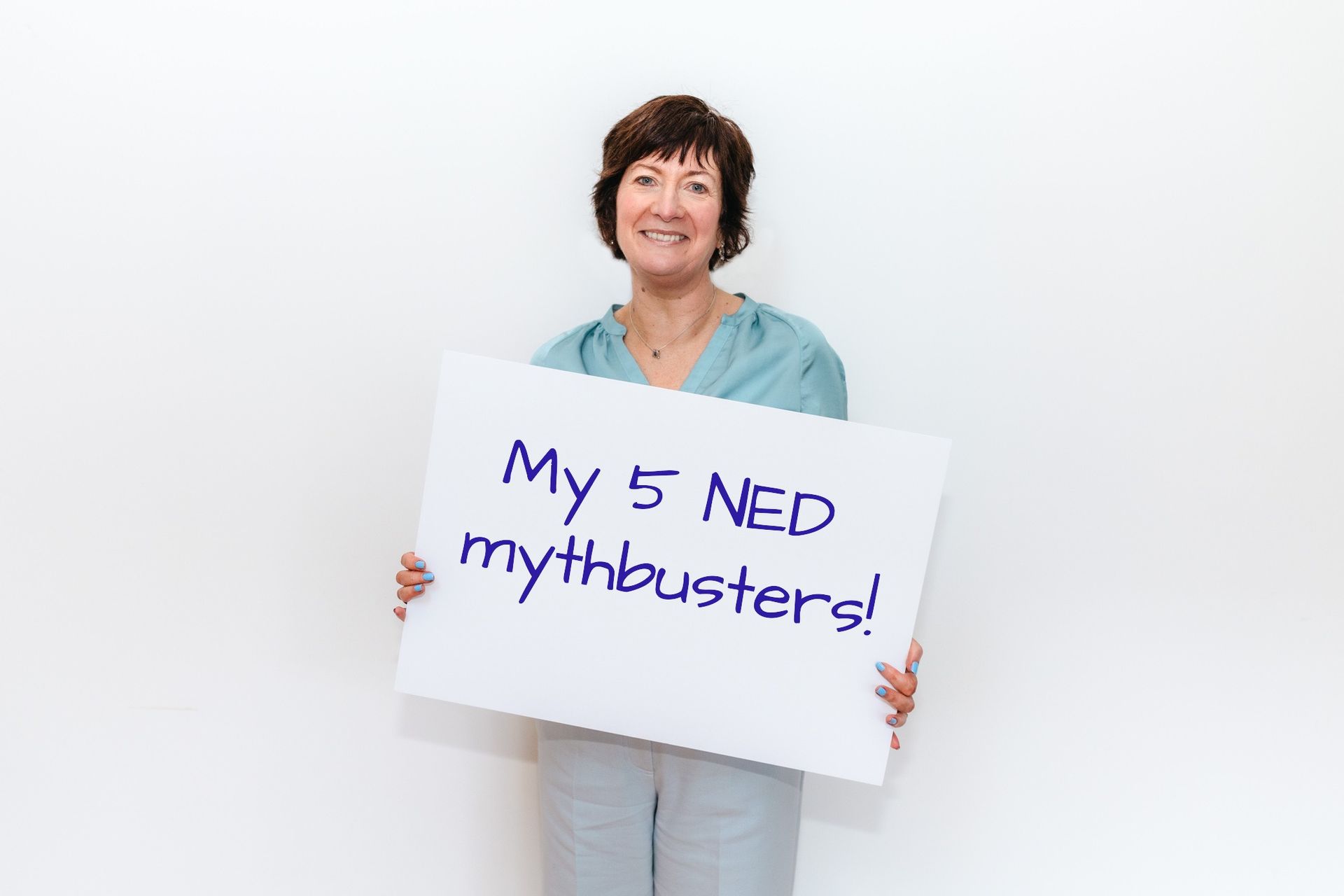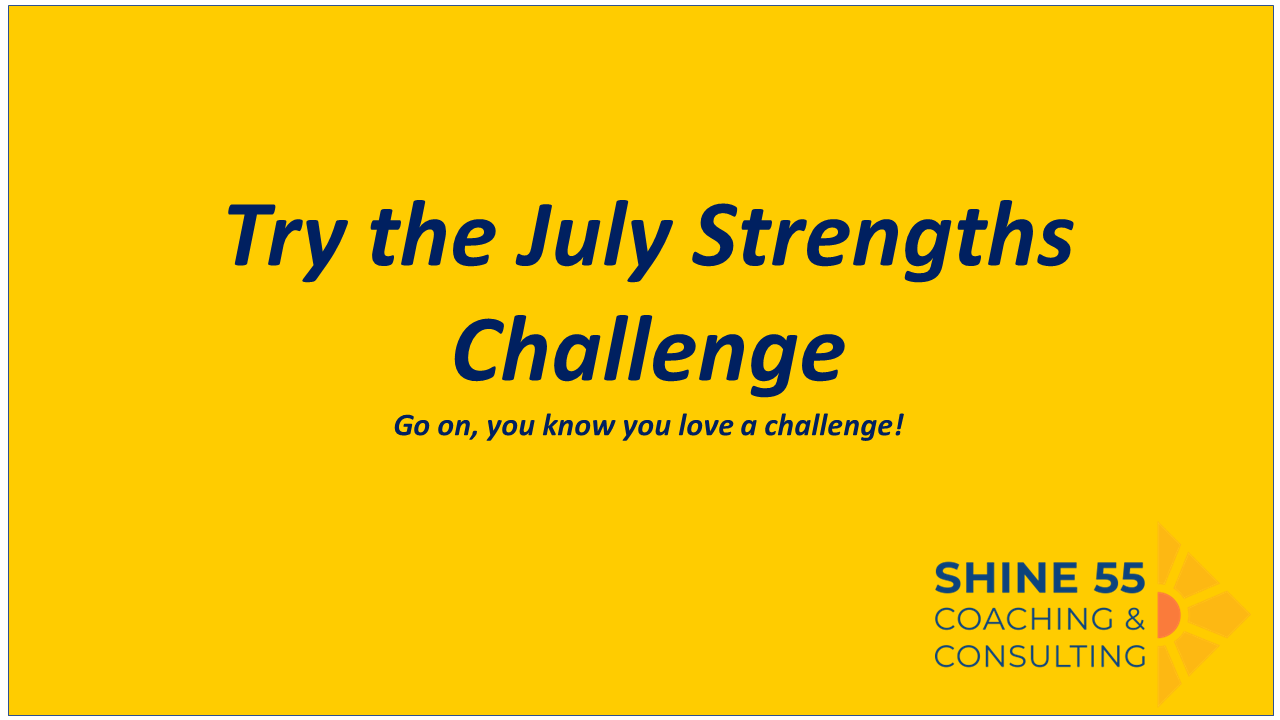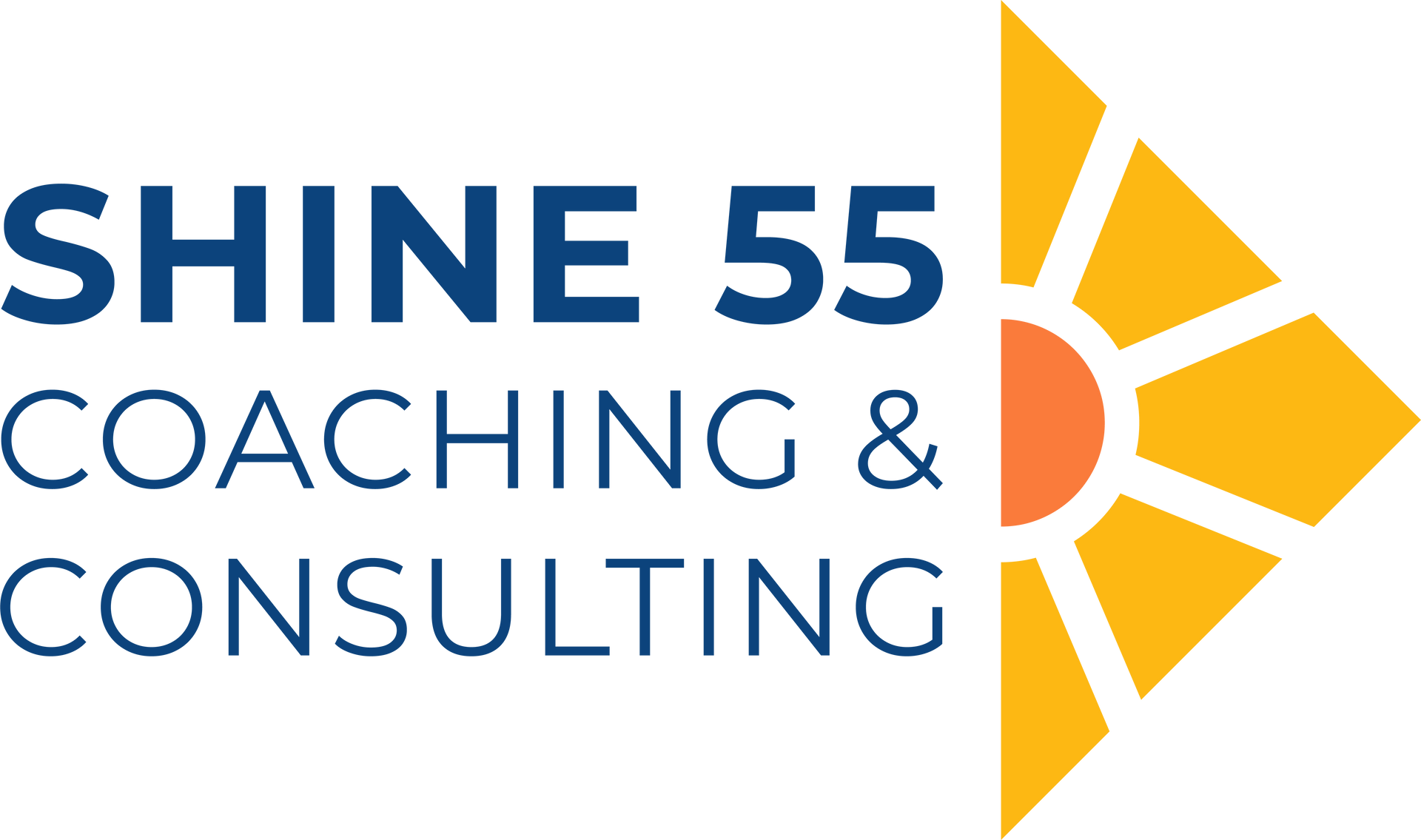Shine 55 Coaching & Consulting Blog
In this blog I share tips and address some of the common career questions and challenges that are on peoples’ minds.
If you’d like to stay in touch and hear further insights on key career topics, you can connect with me on LinkedIn.


5 Myths about Non-Executive Director Roles Let's be clear: being a NED can be an incredibly rewarding experience, when you find the right fit. It's an opportunity to leverage your skills, contribute to society, and forge new connections. For many, it also offers more flexibility compared to a full-time executive role, especially if you embrace the variety of a portfolio career, working with multiple organisations. Sounds amazing, right? It often is! But you need to approach this career path with your eyes wide open. Read on for five common myths about becoming a NED, so you're fully prepared for the journey ahead. Myth 1: All NED roles are highly lucrative The truth? NED compensation varies widely. Some roles, particularly in the Not-for-Profit sector (often called Trustee roles), are unpaid. At the low er end, you mig ht earn £5.6k as a NED for a Housing Association or £13k at an NHS Trust. In contrast, FTSE companies often pay around £76.8k. Rates typically rise for Board or Sub-Committee Chairs or Senior Independent Directors. An increasingly popular variation is the “investor NED” role, common in startups and scale-ups. These roles often involve personal investment, and your compensation might include equity or shares instead of, or in addition to, a traditional salary. Keep in mind, this type of role can carry both higher financial risks and rewards, as well as a different role profile to that of a traditional non-executive director. If you’re looking for a “get rich quick” scheme, a NED role isn’t the right path. But if you’re seeking meaningful work with fair remuneration (depending on the role), it could be a perfect fit. Myth 2: NED roles are only for those approaching retirement Not anymore! While becoming a NED was once a natural progression for retired executives, today’s landscape is very different. Many professionals take on NED roles while still in full-time employment. Why? A NED role can boost your leadership skills, expand your business acumen, and accelerate your executive career. It’s also a win-win for your employer. Bringing fresh insights from another organisation back into your current role can make you a more valuable asset. If you’re considering a “working NED” role, have an open conversation with your employer. It’s vital to ensure that both roles can be managed effectively without conflict. Read my blog 'An Executive's Guide to Becoming a Non-Executive Director' to find out more. Myth 3: Being a NED is an easy meal ticket The perception of a NED role as a “two days per month” commitment is misleading. While the number of formal meetings may seem light, the preparation, research, and behind-the-scenes work are often substantial. Expect to spend hours reviewing board packs (which can run to hundreds of pages), engaging with stakeholders, attending strategy days, and occasionally stepping in during critical situations like CEO recruitment or major contract decisions. While NEDs don’t handle day-to-day operations, they do bear fiduciary responsibilities and are accountable for the company’s actions. Continuous professional development (CPD) is also essential, you can’t afford to be an “out-of-date” NED. A good rule of thumb? Double the time commitment you’ve been told. And if possible, speak with current NEDs on the board to get a realistic sense of the time demands. Myth 4: You can only be a NED in your current sector or industry It’s true that some organisations prefer candidates with industry-specific experience, but many focus on transferable skills and relevant expertise instead. For example, if you’ve worked in heavily regulated environments, you may qualify for roles in other regulated sectors outside your industry. Similarly, technical experience in areas like digital transformation or financial oversight can make you a strong candidate for diverse opportunities. The key? Tailor your application to clearly explain why you’re a great fit. With NED roles often attracting 100+ applications, your submission needs to stand out and be easy for recruiters (and recruiting algorithms) to review. Myth 5: It's a job for life Landing your first NED role is a significant achievement, but don’t assume it’s a lifetime appointment. Most NED roles are fixed term, typically 3-5 years, with the possibility of renewal. However, organisational needs can shift over time. A company’s strategy might evolve, requiring different expertise on its board. Or, as part of your portfolio career aspiration, you need to rebalance your roles to avoid potential conflicts of interest. Flexibility is key. Embrace the transience of NED roles as part of the excitement of your career journey. Final Thoughts Becoming a Non-Executive Director can be one of the most fulfilling chapters of your professional life, but it’s not without its challenges. By debunking these myths, I hope I’ve given you a clearer picture of what to expect and how to prepare. Whether you’re eyeing a role in a large corporate, a startup, or a not-for-profit organisation, the right NED position is out there for you. Take your time, do your research, and ensure the roles you pursue align with your goals, values, and lifestyle.

Have you thought of becoming a NED? It’s a common belief that becoming a NED is a step taken only after leaving a full-time executive career. However, more executives are taking on NED roles while still working full-time. The UK Corporate Governance Code supports this, recommending a limit of one NED role to ensure executives can meet their primary responsibilities. Balancing both roles can be incredibly rewarding, but it’s essential to go in with a clear understanding of the challenges. Benefits of a NED Role while Working Full-Time 1. Broader business exposure - A NED role provides insight into different industries and corporate structures, broadening your strategic thinking. 2. Enhanced governance and boardroom skills - NEDs play a key role in governance and oversight, making it a great opportunity to build leadership and strategic skills. 3. Expanded network & influence - Joining a board connects you with other senior leaders, opening doors to new business and career opportunities. 4. Personal & professional development - With the average NED tenure at 4.3 years, these roles provide stability and a chance to influence long-term strategy. 5. Career progression - A NED role can help position you for a future portfolio career, demonstrating versatility and governance expertise. Challenges of Holding a NED Role while Working Full-Time 1. Time commitment - NED roles typically require 10-40 days per year, not including additional time for unplanned matters. This can add pressure to an already demanding schedule in a full-time executive role. 2. Potential conflicts of interest - Holding both roles, especially in related industries, can lead to conflicts. Transparency and clear boundaries are essential. 3. Regulatory & compliance risks - NEDs share equal responsibilities with executives and must stay diligent to avoid reputational and legal risks. 4. Employer perception - While many companies support executives taking NED roles, some remain sceptical about managing both commitments. This can be an issue amongst recruiting boards too. Key Considerations Before Accepting a NED Role 1. Discuss with your employer - Ensure your employer is supportive and there are no conflicts with your current role. 2. Assess your availability - Although board schedules are typically planned a year in advance, unexpected demands can arise. Be realistic about your capacity. 3. Choose the right organisation - Pick a company where you can add value and learn. Consider industry relevance, company culture, and governance standards. 4. Understand your legal responsibilities - NEDs have legal and financial obligations. Make sure you’re clear on your responsibilities before committing. 5. Maintain your work-life balance - The unpredictability of NED responsibilities can affect your personal time. Make sure you can balance both roles effectively. Final Thoughts Holding a NED position while working full-time can be an incredible opportunity for growth, learning, and networking. However, it’s important to weigh the benefits against the potential challenges. If you decide to take on a NED role, ensure it aligns with your career aspirations, time capacity, and employer’s expectations. Done right, it can be a strategic and fulfilling addition to your career.

Stepping into the world of Non-Executive Directorships for the first time can feel a little like turning up at a swanky dinner without being sure you've got the dress code right. You know you've got the experience, but you're also aware that everyone else seems to know the "unwritten" rules of the boardroom. As both an executive coach and an active NED, I've seen first-hand how boards view first-time candidates. The good news? Many boards are open to fresh perspectives. The challenge? They also need reassurance that you'll be effective from day one. What's on the Board's Mind? Governance Competence - Boards are guardians of governance. They need to know you understand fiduciary duties, risk, and regulation. A recent study from the Institute of Directors highlights that legal responsibilities consistently top the list of board concerns about first-time appointees. They're not looking for a lawyer in disguise, but they do want evidence that you've done your homework. Strategic Contribution, Not Operational Control - First-time NEDs sometimes stumble by slipping back into "executive mode." Remember, your role is to challenge and support , not to roll up your sleeves and manage. A recent FT survey of NEDs noted that boards prize candidates who can balance constructive challenge with collaboration. Boardroom Dynamics - Fit matters. Boards want to know you'll contribute with confidence and humility. In my own experience, a sense of humour (used wisely!) can go a long way to building trust. How to Frame Your Application & Interview Tailor your CV - Don't just repackage your executive achievements. Highlight experiences where you've influenced strategy, governance, or risk. Boards want to see evidence of oversight, not just delivery. Show Awareness of the Shift - In interviews, explicitly acknowledge the difference between executive and non-executive responsibilities. This demonstrates self-awareness, which boards value highly. Demonstrate Curiosity & Perspective - Ask thoughtful questions about governance priorities, emerging risks, and stakeholder expectations. This shows you're already thinking like a NED. Emphasise Diversity of Thought - Many boards are actively seeking fresh insights. If you bring sector expertise, digital know-how, or an ESG perspectives, don't hide it under the table. The Bottom Line Boards aren't necessarily wary of first-time NEDs, they're simply cautious. Your task is to reassure them that, while you may be new to the title, you're not new to the mindset. Frame your experience through a governance and strategic lens, and you'll position yourself as board-ready. How my NEDfit coaching programme can help NEDfit helps aspiring non-executive directors land their first best-fit role, and thrive once they're in position. Through one-to-one coaching, small group programmes, and workshops, I provide the practical guidance and support I wish I'd had when starting my own NED journey. As an active NED and qualified executive coach, I combine real-world experience with tailored development to set you up for success. And yes, I'll even help you decide your outfit for that swanky dinner.

In today’s fast-paced corporate world, executives are expected to deliver results, lead divisions, and drive organisational success, all while juggling a relentless stream of demands. The sheer volume of responsibilities can be overwhelming, even when things are going well. Yet, counterintuitively, slowing down can be the key to sustaining high performance. Taking deliberate pauses allows you to: • Rebuild your energy levels • Enhance creativity with a clear mind • Reflect on key learnings • Engage stakeholders for input and buy-in, especially when leading change. Research from the American Psychological Association shows that 30% of employees perceive hidden agendas in change initiatives. Slowing down helps build transparency, trust, and alignment, essential for successful transformation. Moreover, as a leader, you set the tone for your organisation. If you constantly operate at full speed, you risk burning out not only yourself but also your team, ultimately eroding workplace culture. Five Ways to Slow Down Without Losing Momentum 1 Enough is Enough Perfectionism can be a strength, but it can also be a trap. Sometimes, what you’ve done is sufficient. Prioritise tasks by assessing their true value. Ask yourself: o Is perfection necessary, or is progress more important? o What’s the opportunity cost of spending more time on this? o Will there be an opportunity to refine it later? Learning to say “this is enough” frees you to focus on what truly matters. 2 Empty Time is Valuable Time A meeting-free day on your calendar, great! But does it trigger anxiety or relief? Too often, we equate busyness with productivity. Instead of filling every open slot, use that time intentionally: o Take a walk to clear your mind o Have informal conversations with colleagues o Simply pause to reflect. Margins in your day create the space needed for strategic thinking and innovation. 3 When Life Speeds Up, Slow Down The natural response to increased pressure is to accelerate, but this can lead to burnout. A simple yet powerful tool is controlled breathing. Try this: o Inhale deeply through your nose for five seconds o Hold for five seconds o Exhale slowly through your mouth for five seconds This 30-second exercise can reduce stress and improve focus. If you want to explore this further, check out SKY Breath Meditation. 4 Reframe Your Experience Almost anything can feel dreadful or enjoyable, depending on how you approach it. When faced with an unpleasant task: o Accept it as necessary o Shift your mindset to find a positive aspect o Engage fully in the moment. A change in perspective can make the experience far more manageable, and sometimes even rewarding. 5 No is Just as Valid as Yes Saying “yes” to everything is unsustainable. Every commitment comes at a cost. Before agreeing to something, ask: o Does this align with my top priorities? o Will this task take more from me than it gives to others? o By saying yes, what am I saying no to? The ability to say “no” strategically allows you to invest your time and energy where they matter most. Final Thoughts: Slowing down isn’t about doing less, it’s about doing better. By taking the time to reflect, reset, and engage with intention, you’ll not only enhance your own leadership effectiveness but also cultivate a healthier, more sustainable work culture.

Welcome back to my mini-series on the challenges faced by senior leaders, drawing on my own experiences both as a former C-suite leader and as an executive coach. If you missed Episode 1, "From Busyness to Clarity," click here: https://www.shine55.co.uk/from-busyness-to-clarity-episode-1-of-c-suite-learnings . Meanwhile, this episode looks at some of the unexpected mental distractions that often trip up senior leaders. Spoiler alert: This isn’t about muting notifications or cutting out email distractions. This is a deep dive into the mental roadblocks that, if left unchecked, can erode confidence and derail success. In this episode, I explore three all-too-common distractions often experienced by senior leaders: 1. The Seeds of Doubt 2. The Research Rabbit Hole 3. The "Go-To Problem Solver" Trap Let's dig into each of these—and how you can keep them from sabotaging your path forward. 1. The Seeds of Doubt When you’re in the hot seat, making decisions that impact not just the organisation but the people within it, doubt can creep in, especially when you’re lacking perfect information. This can lead to over-thinking and catastrophising. The Fix: Ask yourself 3 key questions: 1. Am I the right person to make this decision? – Consider if there’s someone closer to the details or with specialised knowledge who could weigh in. Leaning on experts or even an executive coach or mentor can free you from the cycle of indecision. 2. Can I rely on my intuition? – Experience counts for a lot. Trust your gut and remember that years in your field are likely to have given you instincts worth trusting. Even if you don’t have all the data, believe in your ability to course-correct if necessary. 3. What is the most realistic outcome if I make the wrong decision? – Invest some time in identifying ways to reduce the impact. The takeaway? Make peace with imperfection, and your intuition can be a valuable tool in effective decision-making. 2. The Research Rabbit Hole Curiosity is a wonderful trait in a leader for professional and personal development , but it can also become a dangerous distraction. Here’s a light-hearted example of my own. I was lucky enough to go Greek island hopping. What started as an exciting decision spiralled into weeks of researching islands, accommodations, and travel routes—all in pursuit of finding the “best” option. When I finally bit the bullet and circled back round to book the ‘perfect’ hotel, the price had gone up by 15%! We’ve all been there, right? When it comes to decision-making, endless research can quickly take over and you’ve lost valuable time. Why? Often, it’s driven by FOMO or a desire to avoid commitment. The Fix: Apply the Pareto Principle: 80% of your results come from 20% of your efforts. Here’s how: • Identify the minimum “must-have” data points. • Rely on considered assumptions for the rest. • Embrace a mindset of experimentation and iteration—you don’t need perfect clarity to make a great decision. Remember, the goal is to get just enough information to make an informed choice. Then, act on it. 3. The 'Go-To' Problem Solver Trap If you’re constantly swooping in to solve every problem, two things happen. First, you disempower your team by becoming the only source of solutions. Second, you rob yourself of the space needed to focus on strategic goals. It can be particularly challenging for new/aspiring senior leaders, when you need to shift your perspective from team leadership to organisation leadership. Ask yourself if your need to jump in is driven by a desire to feel useful or it’s a more comfortable space for you—because, in reality, this can become a burden on both you and your team. The Fix: Shift from problem-solver to coach. Here’s one way to think about it. When a team member brings you a problem, ask: • “What are three ways you might solve this?” • “How would you like to tackle it and why?” • Encourage them “I trust your judgment—go for it.” Not only will this empower people, but it will free you to focus on leading, not micromanaging. Bonus distraction: Pessimism! Scepticism has its place in leadership, but persistent pessimism can drain morale—yours and your team’s. Your role is to set the vision, and if you’re the “mood hoover,” it sends a signal that you lack confidence in your people. The Fix: Replace negative thoughts with positive affirmations. This isn’t just a feel-good exercise; studies show that affirmations reduce cortisol, the stress hormone. A simple shift in mindset can help you show up with a sense of optimism and clarity, which others will mirror. Conclusion: Distractions come in many forms for senior leaders, but the ones that truly jeopardise success are often mental. Recognise them, confront them, and remember that the best leaders are those who can focus on the big picture while empowering others to solve the details.

Recently I was lucky enough to have a 2wk holiday. Whilst I was away, I felt the familiar gift of clarity that often accompanies a break from the everyday rush. This time out gave me an abundance of ideas for my new blog mini-series. Here, I’ll share insights from my experiences as a former C-suite executive. In Episode 1, I explore one realisation I had: shifting from busyness to clarity. The Busy C-Suite Trap: Why So Many Senior Leaders Don't Take a Break A recent Deloitte survey revealed that 73% of C-suite executives avoid taking time off because of overwhelming workloads. I know the feeling well—the gnawing fear that if you take a week off or unplug from email, things will spiral out of control. Yet, in all my years, I never once saw the world end because I took a break. In fact, stepping back often gave me a fresh, clearer perspective and a renewed sense of purpose. For many senior leaders, “busyness” becomes a kind of badge of honour. If you’re constantly busy, it feels like you’re contributing at a high level. But for many leaders I’ve coached, this constant activity often conceals a lack of alignment with our true priorities. The Addictive Nature of Busyness The cycle of busyness can be highly addictive. Checking off items on a to-do list provides a dopamine hit, giving a sense of accomplishment that can mask deeper, more strategic work that may not fit as neatly into daily checklists. I remember my own to-do lists, seemingly endless, with new tasks emerging faster than I could complete them. In hindsight, I realised that some tasks didn’t contribute to the higher-level objectives of the business. The Vibe You Project: From 'I Know You're Busy' to Open Communication One eye-opening moment came when I noticed a pattern: almost every conversation a team member initiated with me began, “I know you’re busy, but…” I began to worry that the message I was sending was that my team’s input was an interruption rather than an integral part of my role. My busyness had, unintentionally, created a barrier. Clearing the “busy” signal is an important way to empower a team to engage more freely, and is also an active reminder as to your role as a leader, not just a doer. Shifting Perspective: Moving from Busyness to Clarity It’s easy to say, “Work smarter, not harder.” But for leaders in the thick of high-stakes decisions, this shift in mindset can feel impossible. Here’s one way I support my coaching clients to identify how to reduce busyness while increasing clarity and effectiveness. The Frame Game: A Tool for Clarity and Focus This simple exercise can help you assess how you’re spending your time and ensure alignment with your true priorities. 1. Reflect and Write: Without overthinking, jot down everything you’ve been doing or thinking about over the last month. Set a timer for 10 minutes and capture as much as you can. 2. Draw Your Frame: On a blank piece of paper, draw a large rectangle. This represents your ideal work focus as a senior leader —the activities that align with the strategic priorities of your C-suite role. 3. Classify Inside and Outside: Place each item you’ve written either inside or outside the frame. This will help you see where your time aligns with your role—and where it might not. Now, use these reflection questions to gain insight into your current situation and identify potential adjustments: Q1: Are you spending most of your time on activities inside or outside the frame? If the majority are outside, this may indicate a need to refocus on your high-impact responsibilities. Q2: Are there essential activities missing from the frame? For example, if your job profile emphasises strategic planning, but your frame is missing time for this, it’s worth examining why. Q3: For the tasks outside the frame, ask yourself: Can these be automated? Can they be delegated? Do they even need to be done? Reflect on how each category of tasks makes you feel. This emotional response can reveal valuable insights, often pointing toward areas for development or even suggesting directions for your future career focus. Conclusion: Finding Value Beyond Busyness The journey from busyness to clarity is an essential one for any leader. By examining where your time and energy go, you can avoid the “busy fool” syndrome and channel your efforts into the high-level work that truly makes a difference. Stay tuned for Episode 2 of this series, where we’ll dive into the art of managing distractions—a critical step in reclaiming time and focus in the C-suite.

Are you contemplating a move to the C-Suite? Transitioning into this level is a significant career milestone, but it’s also a substantial shift that demands a new set of skills. While both C-Suite and Director roles involve leadership, the scope and impact of that leadership are amplified in the C-Suite. Instead of focusing on specific departments or executing strategies set by others, you’ll be making high-stakes strategic decisions and setting the vision for the entire organisation. It’s a challenging but incredibly rewarding position for those who are prepared. If you’re aiming for the C-Suite, here are five crucial skills you should develop: 1 Master Social Skills Surprisingly, social skills top the list. In today’s fast-paced business environment, the conditions for success are rapidly changing, and leaders who align with their employees’ values and priorities are in high demand. Social skills extend beyond good communication; they encompass self-awareness, empathy, and the ability to understand and work effectively with diverse teams. As a C-Suite executive, you’ll be one of the most visible leaders in the organisation, both internally and externally. You’ll need to be a role model and ambassador. Failing to communicate effectively can have detrimental consequences for both you and the organisation. Navigating complex situations with difficult personalities or competing agendas is often part of the job, making strong social skills indispensable. 2 Cultivate Adaptability Adaptability is crucial for any C-Suite leader. In previous roles, you may have focused on being receptive to change or leading your division through change. However, in the C-Suite, your responsibility shifts to identifying the need for change and rethinking organisational structures, processes, and mindsets. Successfully navigating rapidly changing markets and technological advancements requires a proactive and adaptive approach. 3 Foster Creativity & Innovation Organisations often stick to familiar strategies to avoid risks, but this approach can leave them vulnerable in a constantly evolving business landscape. As a C-Suite leader, standing still is not an option. You must embrace creative thinking and innovation to keep your organisation agile and competitive. This involves challenging the status quo, encouraging diverse perspectives, and exploring unconventional solutions. 4 Fearless Approach to Risk Management C-Suite executives are responsible for making high-stakes decisions, often with limited or no data. This requires a fearless approach to risk management. As you drive creativity and innovation, you’ll need to navigate uncharted waters and take on greater professional risks. Developing the ability to manage big risks effectively is essential for success at this level. 5 Build Digital Know-How In today’s digital age, understanding emerging technologies is increasingly important for C-Suite leaders. Whilst it’s not expected that all members of the C-Suite are as tech-savvy as the CIO or CTO, it’s important to have a good understanding of important technologies that can differentiate the organisation’s proposition or drive value across the enterprise. Understanding critical data management, automation platforms and technologies is key. Digital know-how will enable you to make informed decisions that propel your organisation forward. Stepping into the C-Suite is not for the faint-hearted, but with these skills in your toolkit, you’ll be well-prepared to take on the challenges and rewards of executive leadership.

Do you find it hard to say No? We’ve all been there—grappling with the willpower to turn down that extra glass of wine or resist the temptation of a delicious dessert. But when it comes to the workplace, how often do you find it to say "No"? This challenge is a recurring theme with some of my executive coaching clients. Whether you are just starting out or an experienced C-suite executive, it can be a struggle to break the habit of saying "Yes" to every request that comes your way. Consider these all-too-familiar scenarios: You’d be doing me a massive favour if you could take this on for me. We need someone to champion this, and I know you’d be great at it. I realise you’re swamped, but this is REALLY important. There’s an awkward silence in the meeting, and you break it by saying, “I’ll do it. You think to yourself, “If I don’t do it, it won’t get done.” If these situations resonate with you, you’re not alone. While being helpful and accommodating can be strengths, overextending yourself can lead to burnout, decreased job satisfaction, and a lack of focus on your strategic priorities. The Impact of Saying Yes Too Often Saying "Yes" to everything might feel like the path of least resistance, but it can have significant consequences. You might find yourself overwhelmed with tasks that don’t align with your values or goals, or you might constantly sacrifice personal time, leading to stress and exhaustion. This not only affects your well-being but also diminishes your overall productivity and effectiveness at work. But let’s be clear—I’m not advocating for a blanket refusal of all requests. The key is to strike a balance that allows you to maintain your integrity, protect your time, and focus on what truly matters. The Helicopter Approach: A Strategy for Saying No If the thought of saying "No" fills you with dread, consider using what I call the "helicopter approach." This mental exercise can help you gain perspective and make more thoughtful decisions: Step Back and Reflect: Notice what you’re thinking, feeling, or experiencing in the moment. Pause and resist the urge to justify why you should say "Yes." Consider the Other Person’s Perspective: Imagine you’re the one making the request. What might you be thinking or feeling? Is the situation truly as urgent or dire as it seems? Will their world collapse if you say "No"? Observe as a Third Party: Visualise the situation from the perspective of an outsider. What do you see, hear, or think about this interaction? Give Yourself Advice from the Observer’s Perspective: What advice would this impartial observer give you? How do you feel about saying "Yes" now? This exercise helps you step out of your immediate emotional reaction and see the situation from different angles, often making it easier to assertively decline. A Lesson in Saying No: My Story Let me lighten the mood with a personal experience that illustrates the power of saying "No"—and how, often, the consequences are far less significant than we fear... I have an irrational fear of cows. Yes, cows. When I’m out hiking, I’ll go miles out of my way to avoid crossing a field full of these gentle giants. Just last week, I was on a beautiful hike when I encountered yet another field of cows with no way around it. I stood at the stile for what felt like an eternity, debating my options. A dog walker passed by and asked if I was okay. I joked, “Yes, of course, I’m just deciding whether to risk life and limb by going through this field.” Secretly, I hoped they’d offer to walk with me, but they just wished me “Good luck” and continued on. With no other choice, I decided to stick to the edges of the field, power-walking with one eye on the cows. But halfway across, they started running toward me—about 20 of them! I panicked, knowing I couldn’t outrun them, and with nowhere to hide. But then, something clicked. I turned to face them, adopted my best John Wayne stance, and shouted, “NO, NO, NO” with all the authority I could muster. To my amazement, they stopped in their tracks and sauntered off. I left that field half a stone lighter from the sweat and stress, but with a valuable lesson: while saying "No" can feel daunting, it’s often of little consequence to others. Conclusion: Embrace the Power of No The next time you’re faced with a difficult decision about whether to say "Yes" or "No," remember the cows. Often, the anxiety we feel about turning someone down is far greater than the actual impact of our decision. By using the helicopter approach and practicing assertiveness, reclaim your time and energy, focus on what truly matters, and ultimately achieve a more balanced and fulfilling professional life.

Playing to your strengths? Maybe. But are you continuing to develop them? There are endless wise words about strengths. Play to your strengths. Surround yourself with a team who counterbalance your weaknesses. Every failure makes you stronger. The list goes on. But how much time do you invest in developing your strengths so that they become real superpowers? Whilst sitting in my local coffee house, cradling a flat white, I realised that my approach to developing my strengths was inconsistent. Scenario 1: For strengths that I enjoy using, there are two outcomes. Firstly, I actively seek out situations to deploy those strengths, so getting the implicit benefit of ‘practice makes perfect.’ Secondly, I am all over the personal development around this, seeking out podcasts, articles etc that help me build on these further. Scenario 2: Strengths that I know that I have, but deploy them out of necessity, which takes away the enjoyment and satisfaction, and more importantly means they could do with some dusting off. With the words ‘practice makes perfect’ ringing in my ears, I selected three to focus on this month... Creativity - surprising for someone who got an ‘Ungraded’ in their Art O’ Level I know. Bravery - you may not find me first in the queue volunteering to bungee jump, but I will put myself in situations that are massively outside my comfort zone. These decisions are sometimes facilitated by a G&T, but more often than not, it’s a case of saying ‘Yes’ before the reasons to say 'No' kick in. Perspective – Not so much about keeping things in perspective (another blog topic I feel) but considering multiple perspectives when problem solving. These 3 strengths are powerful in fast tracking personal growth and fulfilment, so can have a positive impact on wellbeing. If these are strengths you relate to, why not try this challenge in July. The goal is to complete all 10 activities. July Strengths Challenge: 1 Consult someone new for a project you’re working on, to get an alternative view 2 Explore multiple solutions to a challenge you’re facing 3 Dream big! Consider the art of the possible on your professional journey, we’ll come back to this topic in a later blog 4 Try a new strategy to improve your productivity 5 Identify a task that you’ve avoided and face it in a new creative way 6 Watch this short YouTube video (6mins) that can motivate you to change your perspective when feeling defeated https://www.youtube.com/watch?v=NS95suaHc18 7 Throw caution to the wind and say Yes to something that normally intimidates you 8 Share a fear with someone you trust 9 ‘Strength spot’ with someone you trust, it’s motivating and makes you aware of strengths you may not have appreciated 10 Choose one way you can be creative this month Join me in the July Strengths challenge, and tell a partner, friend, colleague (or me!) what you’re doing so they can motivate and celebrate with you at the end of the month. Get flexing those superpowers!


